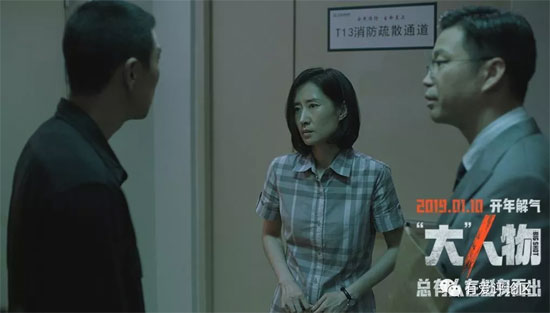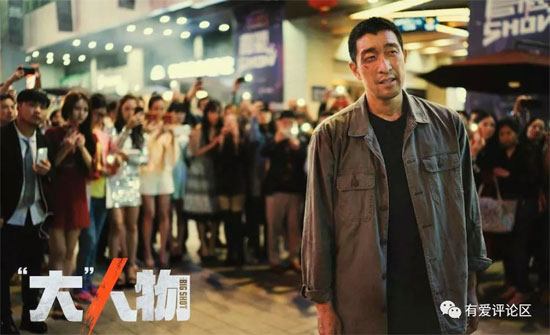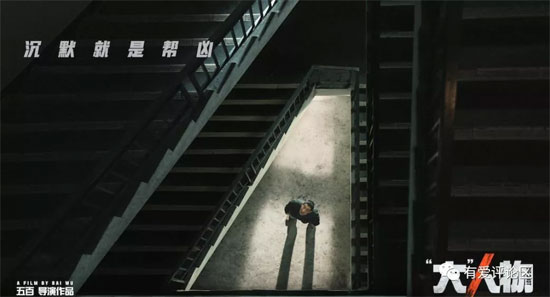Film Name:”大”人物 / Big Match / Mr. Big / The Hot Head / The Big Shot
Judging by its current box office performance and critical reception, Big Match can be considered a success (at the very least, it hasn’t flopped). While offering congratulations, one can’t help but wonder: what exactly made this film—which looks decent but isn’t exactly stellar—succeed?
After much thought, I believe the most crucial factor lies in its “down-to-earth, realistic subject matter.”

To be fair, Big Match still doesn’t rank among the finest crime dramas. Yet its skillful navigation of the boundaries of acceptable content is undeniable, and the cast’s nuanced performances undoubtedly elevate the film.
[Friendly reminder: The following contains minor spoilers]
When it comes to “realistic-themed” films, two domestic productions from last year stand out as particularly representative: Dying to Survive and A Cool Fish.
The former struck a nerve with the era’s traumas, and coupled with solid production values and acting, it became a nationwide phenomenon; In contrast, the latter fell short in many aspects, yet its commercial light-hearted approach to portraying marginalized groups ultimately made it a box office hit and a divisive topic of discussion.
Both examples highlight the significant gap in domestic demand for realistic, credible works that avoid overly heavy-handed presentation.

Big Match is another thought-provoking drama grounded in reality. The opening case involving counterfeit bills sets off a chain of events: developers forcibly demolishing homes, collusion between county-level officials and business interests, and rivalries among local criminal gangs. While solving cases, the detectives juggle worries about school district housing and promotions. Between eating instant noodles, they rehearse performances to showcase the “police-community bond”…
While such depictions of real-life conditions have become more common, audiences never tire of “fleshed-out” characters and stories.
Take Chen Yongqiang’s seemingly minor act of seeking compensation from the Zhao Group—a dispute over 3,800 yuan that escalated into attempted murder. Though initially implausible, the truth revealed makes perfect sense.

When grounded in objective circumstances and character traits, even the most bizarre events become plausible (much like how most criminal cases stem from crimes of passion or chance occurrences).
The protagonist Sun Dasheng targets Zhao Tai due to Chen Yongqiang’s “accident,” and through a series of twists and turns, finds himself locked in a bitter struggle with the Zhao Group. At its core, Big Match remains a story about ordinary people. Sun Dasheng is indeed a small fish facing a local behemoth, yet when he finds his niche and strikes at the opponent’s weak spot, he becomes a formidable force capable of vanquishing demons.
Under this central theme, the film reworks and presents numerous social phenomena.

For instance, Chen Yongqiang’s wife wanting to drop the case exemplifies the typical timidity and risk-aversion of ordinary citizens. Then there are the bystanders who vehemently condemn police “violent enforcement” one moment, only to cheer for their “crackdown on crime” the next—without any apparent contradiction. This portrayal is both precise and bitingly satirical…
Compared to its grounded narrative, what left a deeper impression on me in Big Match was the superb acting—not necessarily because it was flawless, but because many actors revealed both familiar and unexpectedly fresh facets of their craft.
Wang Qianyuan portrays Sun Dasheng, a detective who is fiercely righteous, incorruptible, yet impulsive and hot-tempered.

For Wang Qianyuan, this is a completely new character, yet audiences won’t find him entirely unfamiliar. Traces of Wen Cun from The Piano in a Factory, the steadfastness of Brotherhood of Blades, and the hysteria of Saving Mr. Wu all surface in Sun Dasheng. Blending these traits with fresh elements, we can’t help but marvel, “So Wang Qianyuan can actually play a detective after all” (having not seen last year’s Lobster Cop, I’ll refrain from comment). truly pull off a detective role” (though I haven’t seen last year’s Lobster Cop, so no comment there).
Then there’s Wang Yanhui, recently recognized as a powerhouse actor. His portrayal of Captain Wu in this film feels refreshingly new.

The Dead End, Cock and Bull, A or B, Dying to Survive… In recent years, Wang Yanhui has consistently portrayed unsavory villains in his film roles, cementing a rather fixed impression of him.
This time, Captain Wu’s performance still relies on Wang Yanhui’s signature moves, but with added elements of nagging, protectiveness, and a blend of seriousness and humor—immediately elevating his presence. I’m genuinely grateful the production team tapped into his latent comedic talent…
In contrast, Cui Jingmin’s villainous role is standard fare for Wang Xun. Playing a weakling who bullies the weak and grovels to the strong comes naturally to him.

Additionally, characters like Du Yuan’s Director Zhang, Gao Jie’s Father Zhao, Kou Zhanwen’s Chen Yongqiang, and Mei Ting’s Monkey King’s wife all align perfectly with their established screen personas, so I won’t elaborate further… According to insiders involved in Big Match, many roles weren’t originally cast this way—the final lineup only solidified right before filming began. Yet the finished product works surprisingly well, showcasing the production team’s skill in discovering and positioning actors.
But the biggest surprise in Big Match for me was Bao Bei’er’s portrayal of Zhao Tai.
I recall a Zhihu question from years ago: “Why does Wang Baoqiang seem believable and endearing when acting foolish in Lost in Thailand, while Bao Bei’er comes across as repulsive in Lost in Hong Kong?” One answer stuck with me: Bao Bei’er doesn’t project an innocent or naive image, so when he acts foolish, it feels like he’s scheming under the surface—making him easily detestable. (roughly paraphrased).
Compounded by personal issues and a lack of notable work in recent years, Bao Bei’er hasn’t exactly cultivated audience appeal. Many have even declared they’d “turn and walk away” upon seeing him…

This time, Bao Bei’er nailed his niche—Zhao Tai, the illegitimate son of a mistress, born into wealth yet lacking legitimacy. This background shaped his hypersensitivity and paranoia. Ironically, his father entrusted him with crucial responsibilities. Thus, through seemingly minor incidents, Zhao Tai’s twisted psyche and madness gradually surfaced until he spiraled out of control. — Bao Bei’er seized upon Zhao Tai’s character traits, using his own unlikable appearance as seasoning. His portrayal of the “good-for-nothing rich kid” was surprisingly effective.
If Bao Bei’er can continue to cultivate this approach, perhaps his career and reputation might see a new turning point…
Finally, a word about director Wu Bai. He made his name directing crime-thriller web series, with hits like Guilty of Mind and Day and Night bearing his signature. His work often features various forms of “political incorrectness.”

Today, this has become a major strength in Wu Bai’s feature films: While understanding the boundaries of censorship, he constantly explores pushing those limits (such as the scenes in Big Match where Zhao Tai gathers people for drug use and sexually assaults a female employee, which provoke audience recognition and emotional fluctuations while stopping just short of crossing the line). Moreover, his eye for “selecting” and ‘discovering’ actors is extraordinary, giving his works more room to “execute well” after they are “completed.”
I sincerely hope Wu Bai will deliver even more outstanding works in the future. Creators like him deserve our encouragement.
Please specify:Anime Phone Cases » Big Match “大”人物 2019 Film Review: Big or small, they’re all important figures.